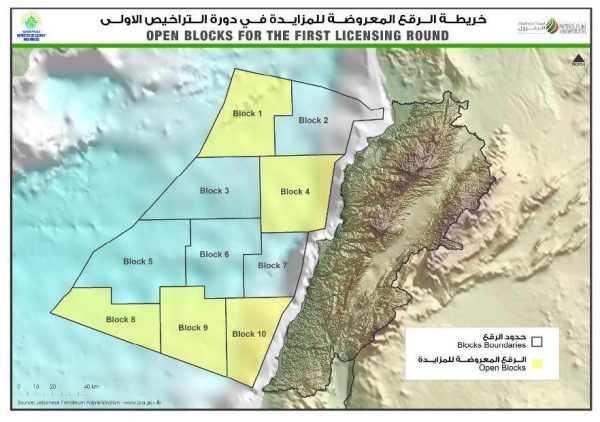By Maria Maalouf
Lebanon this month announced that it had agreed to enter negotiations with Israel over the demarcation of their maritime borders. This week’s opening round of talks came about amid the pressure of US sanctions on allies of Parliament Speaker Nabih Berri and Marada party leader Suleiman Frangieh, and also after Israeli Prime Minister Benjamin Netanyahu revealed the location of a Hezbollah missile storage site. Hezbollah instructed Berri to go ahead with the talks.
Berri, a seasoned politician, realized that the axis of resistance was losing ground and so he stated that the upcoming government of Lebanon is really a pro-Israel government, implying that he could make more concessions in this regard, knowing that Hezbollah had begun to change the composition of its alliances in an undisclosed manner.
Contact regarding the negotiations began with efforts by the US shortly before the arrival of Assistant Secretary of State for Near Eastern Affairs David Schenker in Lebanon last month.
In light of the movements of the EU, moderate Arab countries and the US to confront Iran and prevent weapons from reaching it, coupled with Iran’s threat to carry out attacks in Iraq, Syria, Lebanon and Yemen through its militias, including Hezbollah, we see that Hezbollah does not want the demarcation to happen. Instead, following Iran’s orders, it is playing for time and on the prospect of Joe Biden winning the upcoming US presidential election.
Among the information that reached Hezbollah was Israel’s request to send diplomatic figures — namely Netanyahu adviser Reuven Azar and the Israeli Foreign Ministry’s head of political affairs Alon Bar — at the head of its mission. In addition, the US reportedly requested the taking of a photograph, which was to include the Lebanese and Israeli parties, representatives of the UN, and the American delegation.

Some supporters of Hezbollah and the Amal movement support the option of demarcation and see it as a new victory — forcing Israel to come to Lebanon and negotiate. The political elites in Lebanon, however, include both supporters and opponents of the demarcation. Supporters believe this matter will resolve the Lebanese crisis, but they are ignoring the other important issues on the table, the first of which is disabling Hezbollah’s weapons and handing them over to the Lebanese Army.
The opponents of demarcation believe that it will lead to diplomatic representation and a declaration of normalization with a state that has historically been an enemy. Hezbollah does not want the demarcation to be completed. Rather, it wants to stall while awaiting the US election result.
In the end, the border demarcation file is in the hands of President Michel Aoun, and on Wednesday the Lebanese and Israeli sides will sit face-to-face under the auspices of the UN, opening negotiations in the first meeting between the two parties at the UN Interim Force in Lebanon center in Naqoura.
Maria Maalouf is a Lebanese journalist, broadcaster, publisher and writer. She holds an MA in political sociology from the University of Lyon.
Arab News

Leave a Reply
You must be logged in to post a comment.